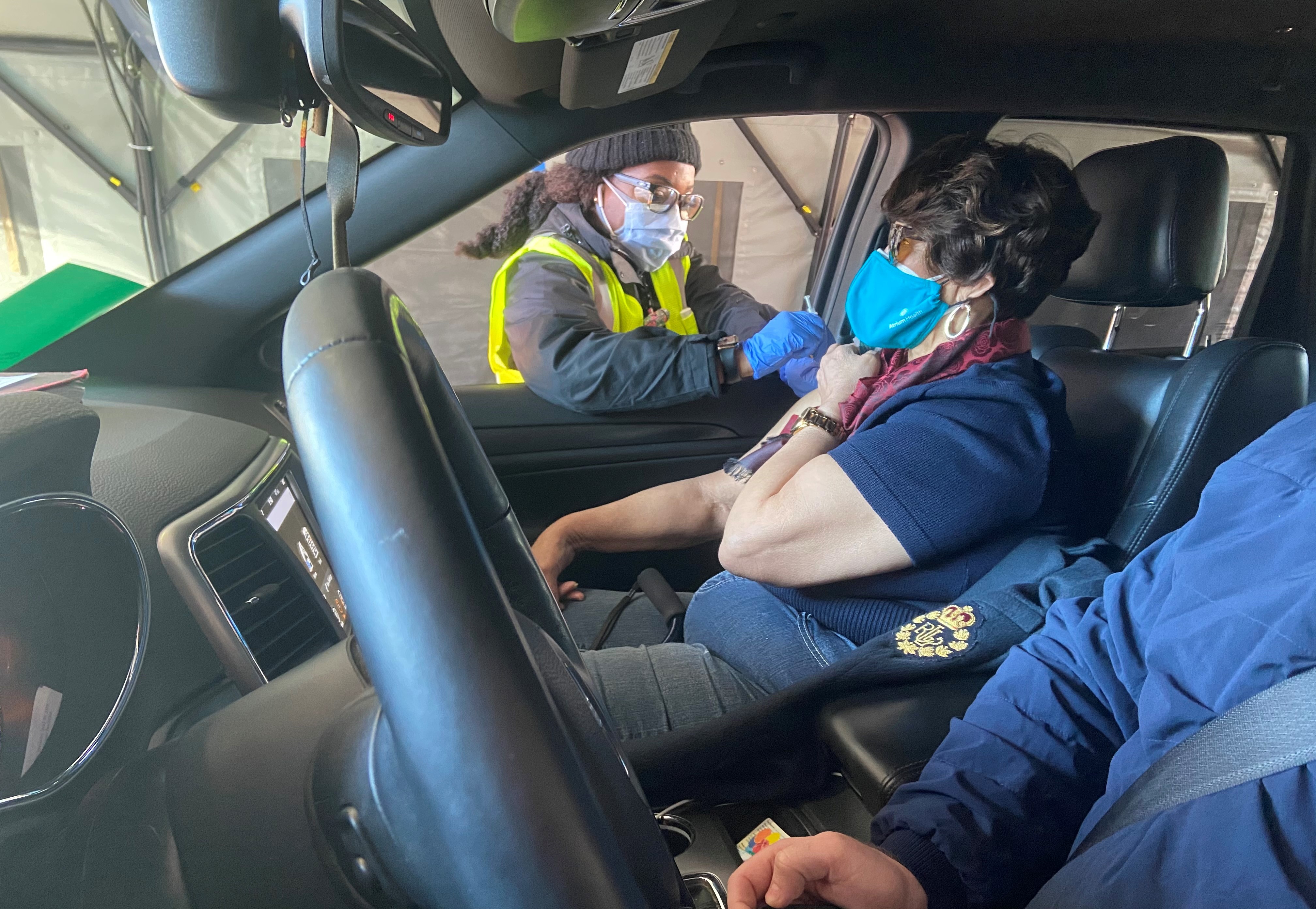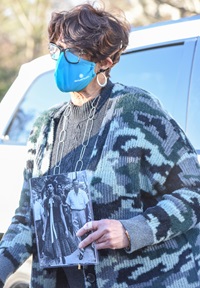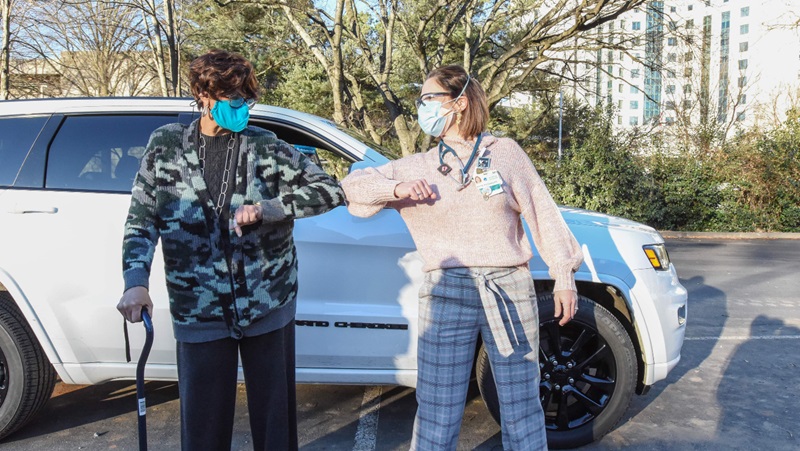Update: On Thursday, January 28 – three weeks after her first dose – Dot returned to Carolinas Medical Center to receive her second dose of the vaccine. "I feel great!" she enthusiastically reports.

 Dorothy Counts-Scoggins’ journey to become a community leader began with a car ride. When she was 15, her father drove her to her first day at Harding High School, where she’d become the first Black student to enroll. On that day, September 4, 1957, she stepped out of the car and embarked on a walk to integrate Charlotte-Mecklenburg Schools. On her way in, children and adults taunted her. Spit at her. Yet she walked, resolutely, each step making history.
Dorothy Counts-Scoggins’ journey to become a community leader began with a car ride. When she was 15, her father drove her to her first day at Harding High School, where she’d become the first Black student to enroll. On that day, September 4, 1957, she stepped out of the car and embarked on a walk to integrate Charlotte-Mecklenburg Schools. On her way in, children and adults taunted her. Spit at her. Yet she walked, resolutely, each step making history.
In the decades since, Ms. Counts-Scoggins has remained a force for equality and hope in Charlotte. Her activism continued with another car ride on January 6, 2021, when she drove to Atrium Health Carolinas Medical Center to join the first members of the Charlotte community to receive the COVID-19 vaccine.
For nearly a year, the virus has disproportionately affected communities of color – higher rates of spread, higher rates of death, a higher economic toll. Ms. Counts-Scoggins has spent most of her life in the northwest corridor of Charlotte, near Johnson C. Smith University, in historic Black neighborhoods. Throughout the pandemic, she’s encouraged others to protect themselves and each other, and to hold hope for better days. Through involvement in her church and the Charlotte Area Fund, she’s distributed more than 500 masks to children and adults, and she keeps extras in her pocketbook for anyone who needs one.
And now, newly vaccinated with her first dose, Ms. Counts-Scoggins encourages others to get a COVID-19 vaccine. Here, in her words, Ms. Counts-Scoggins explains why she decided to get the vaccine, and why she hopes that others do so, too. (Interview has been edited for length and clarity.)
Question 1: How did you feel after getting the vaccine?
Answer 1 | Ms. Counts-Scoggins: Fine. I didn’t have any adverse effects at all – only a little soreness on my arm when I touched it, no different than when I get my flu shot, my shingles shot or my pneumonia shot.
Q2: You’ve said that you were initially hesitant to get the vaccine. What made you change your mind?
A2 | Ms. Counts-Scoggins: The more I thought about it, the more I thought this was the right thing to do. I want to live as long as I can… I also did it for my family members, to encourage them and show them the importance of doing it, as well as people within my community. I know I did the right thing… and I look forward to the second shot as well. I want to be able to get back to my family, my loved ones, even if it’s not going to be right away.
Q3: What would you like to tell people about protection against COVID-19?
A3 | Ms. Counts-Scoggins: This [virus] is serious. This is not something that’s going to just go away. We need to follow the steps that we’ve been told we need to do. It’s not just about us being safe, but it’s about other people being safe as well, because we could be a carrier and not even know it. We could pass it onto others.
We’re all vulnerable to this, regardless what you think and regardless of your age. When [COVID-19] first came out, a lot of people were saying this age group can get it but not that one. I say it doesn't matter whether you are five years old or whether you are 78 years old. We're all vulnerable. We all need to protect ourselves, but we also need to protect those around us.
Don’t believe all the things you hear people say. Listen to what medical facilities say, listen to what the county health department has to say, and do exactly what they say. That’s the only way we’re going to move forward.
Q4: What are you looking forward to doing once the COVID-19 numbers come down and the world begins to open up again?
A4 | Ms. Counts-Scoggins: Well, first of all, I'm looking forward to being able to go back to church on Sunday. And being able to gather with my family, because we are very close-knit family. Also, I am involved in a lot of advocacy groups on this corridor – I’m tired of Zoom, and ready to return to more interactive things. I’m looking forward to getting back to being engaged with people and back to the community.
Q5: Who will get your first hug?
A5 | Ms. Counts-Scoggins: It’ll be my family members. I’ve got two grandchildren who have birthdays next week. Normally, I could give them a big hug, but next week I can’t do that. So when I can hug again, it’ll be my family members.
Q6: What advice to you have for people with COVID-19 fatigue, who are tired of masks and social distancing and want to return to their old lives now?
A6 | Ms. Counts-Scoggins: Hang in there. What is the most important thing for us to do? The most important thing is for all of us to be here to see the next day. Think in terms of the deaths that we’ve had in this country. And think of how many people – when this all started – had no idea that they would not be here in 2021. We need to continue to do what we’re doing.
I had no idea that we would lose so many people. No idea. A large percentage of those were Black and Brown people. That’s the sad part. When we talk about equality, we have to think: How did we allow that to happen? That’s the part we’re all going to have to work on together to make sure everyone has opportunities in our community.
Q7: How can we overcome mistrust to encourage vaccines, and what lessons from COVID-19 should we take going forward?
A7 | Ms. Counts-Scoggins: Mistrust is something that’s been going on forever. And what this pandemic has done is created more mistrust because of what is happening and who it is happening to. And it’s not just those who have had COVID, but those who have been losing their jobs and their homes. I’ve always said we need to continue working together. We have to have these conversations and talk to each other. One thing I’ve seen, in some communities, is that people have come together more to help each other out. And that’s one thing we need to keep doing. COVID is just one piece of what’s happened during this time, and there’s much more we need to talk about to unify.

I always have hope. I have hope that things will get better, that this too shall pass. Because I have a strong spiritual background, I know that things will get better. But we have to hope and believe that things will get better. Yes, this is like a doomsday now, but it’ll get better.
Get your questions answered about the COVID-19 vaccine, including when, where and why to get yours. Access our COVID-19 Vaccine Hub.



